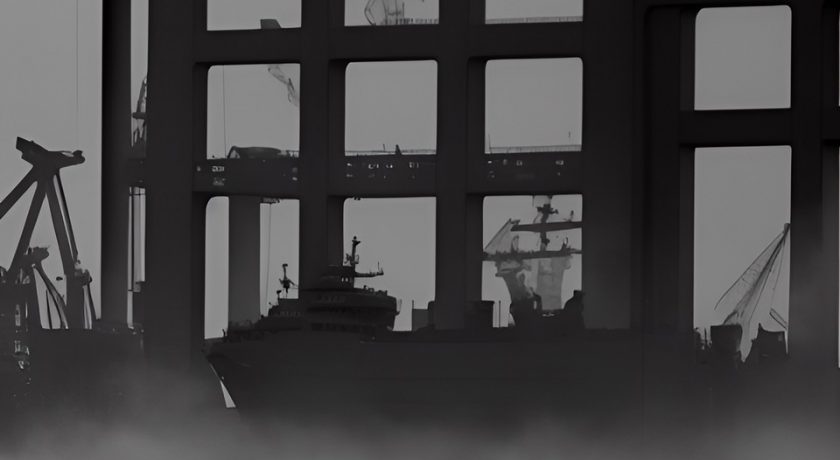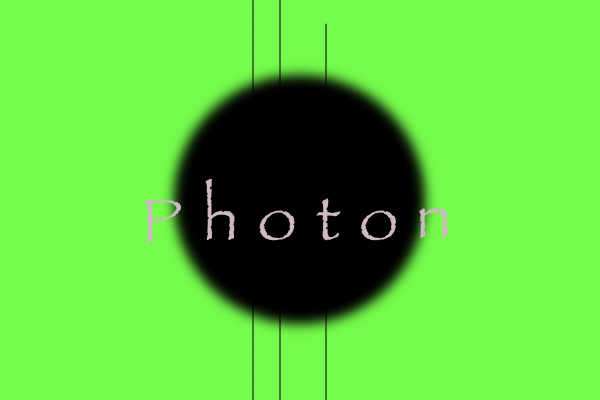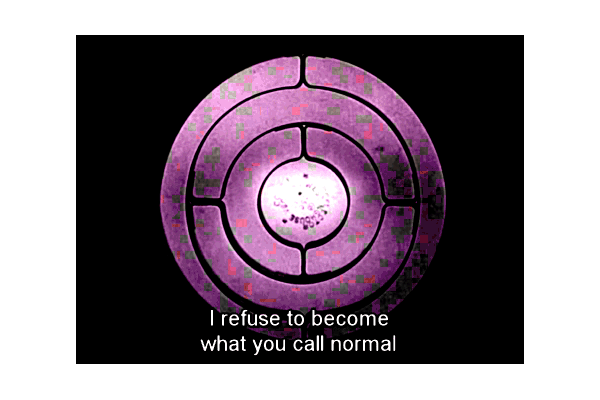NEUES AUS DER ZWISCHENZEIT
Vielleicht ist es nichts, vielleicht nur Strich Strich Strich und Schwung, aber das Bild unten, das uns eine Leserin aus Granada (Spanien) zugesendet hat, war für uns so etwas wie eine Mailbomb. Das Malobjekt erinnert stark an die DIDIMOS-Hand aus der Zukunft. Granada ist einer der Orte, an denen eine frühe Kommunikation über den Einbruch der Zukunft in die Gegenwart stattfand. Die Kommunikation zwischen Ivo Teske und Ira Levant haben wir bereits auf Lesungen thematisiert. Etwa zeitgleich erfolgte das Miranda-Event, das die Grundlage für den Film „Nachrichten aus der Zukunft“ bildet. Miranda selbst ist uns bekannt, Teske und Levant (die beide auch in den Nachrichten aus der Zukunft auftauchen) suchen wir noch, Hinweise bitte direkt an uns.
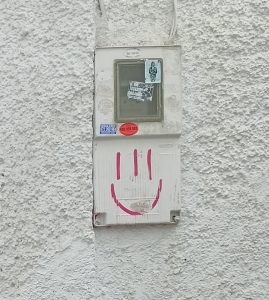
Im November 2023 konnte DIDIMOS in Wuppertal, immerhin der Heimatstadt von Friedrich Engels, im phantastischen, aktuell noch in einer dieser anregenden Transformationsphasen befindlichen Foyer des Pina-Bausch-Zentrums nicht nur den bereits lang angekündigten Kurzfilm von Erica von Möller vorführen, sondern auch Texte und Gedanken präsentieren. Wir empfehlen den Film natürlich zur Diskussion und werden hier weitere Aufführungen und Veröffentlichungen vermerken.

Unser Projekt fängt langsam an, Wellen zu schlagen. Auf dem TEDex-Abend Future World , organisiert von der Uni Potsdam, präsentierte Sven Holly Nullmeyer DIDIMOS und einige der Gedanken, die sich aus dem Nachdenken über die Zukunft ergeben können. Dabei verwendete er die Dreiteilung „Determinismus, Unschuldsversprechen, Anarchodemokratie“. Wir empfehlen den Talk ebenso wie die anderen Beiträge des Abends. Besonders mochten wir die Beschreibung des DIDIMOS-Kollektivs, das laut der Website die „Möglichkeiten der Zukunftserzählung auslotet und sich als Teil einer basisdemokratischen und systemwandelnden Klimakommunikation sieht“. Ein schönes Lob, dem wir uns hoffentlich als würdig erweisen.
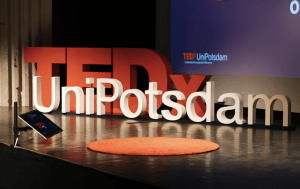
Außerdem verlassen unsere „Nachrichten aus der Zukunft“ langsam die sichere Beschränkung unserer Website. Erica von Moeller legt aktuell letzten Schliff an einen Film aus dem DIDIMOS-Universum … und wir bereiten uns auf die Präsentation des Films und unseres Projekts im kommenden November in Wuppertal vor. Wir würden uns freuen, einige von euch dort zu treffen und in einen persönlichen Austausch zu treten.

Didimos 2052 – das Projekt
Es war so. Irgendwann tauchten auf dem Laptop eines Berliner Übersetzers Inhalte auf, die von sich behaupteten, sie wären aus der Zukunft, genauer aus der Zeit nach 2050 . Rätselhafte Fragmente, Bilder, Filme, irgendwann ganze Artikel. Time shocked tauschte er sich mit Freundinnen und Freunden aus, und siehe da, auch auf deren Laptops erschienen bald Leaks aus der Zukunft. Panik brach aus in diesen Menschenherzen.
Natürlich war alles noch viel komplizierter. Verschlungener. Wir vereinfachen. Jedenfalls begannen wir, eine Freundesgruppe, diese Zukunftsfragmente zu sortieren, und wir erkannten, dass es sich dabei um Teile einer News-Seite aus dem Jahr 2052 handeln musste. Nun also begannen wir, diese zukünftige Seite – Didimos – zu rekonstruieren. Das Ergebnis seht ihr hier.
So wurden wir die Zwischenzeit . Seit dem Glockenschlag 0 Uhr, am 2.2.22, präsentieren wir die Didimos -Site vom 2.2.52 – und werden diese monatlich aktualisieren.
Das alles ist mysteriös genug. Wer mehr über das Projekt Didimos – unsere Archäologie der Zukunft, wie wir Zwischenzeitler das Ganze etwas hochtrabend nennen – erfahren möchte, der möge gerne eine unserer Veranstaltungen und Lesungen besuchen, die wir hier annoncieren werden, sobald es neue Termine gibt. Bislang hatten wir Didimos auf zwei Lesungen/Konzerten im Mai 2019 und im Juni 2021 präsentiert, beide in der Wiesbadener Walkmühle. Es sollen viele weitere folgen.
In hoffentlich naher Zukunft werden wir hier noch einen Link schalten, zu einer externen Website, auf der man mehr über das Projekt, über die Macher und Macherinnen erfahren kann. Inklusive Kommentarfunktion.
Wir wollen uns auch bei den inzwischen vielen Leuten bedanken, die sich an unserem Projekt beteiligt haben, das tun wir unter dem Menüpunkt Komm:unity . Es werden immer mehr, so hoffen wir, von Ausgabe zu Ausgabe, von Drop zu Drop, von Zukunft zu Zukunft.
Was ist das nun also? Echt echt, ein Hoax von Leuten mit zu viel Zeit, Klima-Future-Dichterey? Entscheidet selbst. Und was machen wir damit? Die Zukunft wird seltsam, das Klimaziel bleibt ewiges Ziel, wer nicht gestorben ist, ist älter und verschwitzt. Am wichtigsten: Keine Panik . The future is unwritten.
Didimos ist ein umkommerzielles Kunstprojekt: die Archäologie einer Zukunft.
Didimos wäre nicht möglich ohne viele Menschen und Institutionen, und es werden immer mehr:
Amine Aytulun, Prof. Dr. Karoline Augenstein, Majid Bakhtiari, Antonia Brand, Niklas Bomba, Lola Busch, Massimo Cardascia, Prof. Dr. Alf Christophersen, Leon David Drescher, Carolin Eckner, Travis Elling, Nisrin Fathi, Marc Fischer, Sarah Frede, Johannes Gey, Maelle Giovanetti, Deborah Jo Haas, Prof. Dr.-Ing. Fabian Hemmert, Luisa Herget, Elia Hildebrand, Leonie Jerman, Prof. Dr.-Ing. habil. Anke Kahl, Nicole Klein, Dennis Klima, Mario Krichbaum, David Lankes, Lilli Lengemann, Karen Letz, Milan Liegmann, Lukas Sydney Loßdörfer, Sandra Matic, Erica von Moeller, Clara von Moeller, Thusnelda Mercy, Pascal Merighi, Carel Carlowitz Mohn, Carina Neubohn, Sönke Lars Neuwöhner, Lukas Nickel, Vincent Nickel, Sven Holly Nullmeyer, Philipp Offergeld, Berfin Özcan, Marc Niclas Piesker, Robert Pajak, Prof. Dr. Theda Radtke, Anuya Rane, Moritz Reinisch, Dr. Christopher Reyer, Swantje Riechers, Katrin Riegger, Alicja Rosinski, Stefan Rudolf, Dr. Juliane Petersen, Dr. Swantje Preuschmann, Kateryna Sidorska, Bastian Schemann, Prof. Dr. Philipp Schepelmann, Verena Schmidt, Axel Schweppe, Toralf Staud, Birgit Witteman, Kassi Wolf, Prof. Kristian Wolf, Silas Wolf, Julia Wolff, Dr. Christoph Wolff, In-won Yeo, Tessa Zentis, Matthias Zera
DIDIMOS wird gefördert durch:
European Climate Foundation
Film- und Medienstiftung NRW
Stiftung Mercator
sowie
Künstlerverein Walkmühle Wiesbaden
Bergischen Universität Wuppertal
Wuppertal Institut
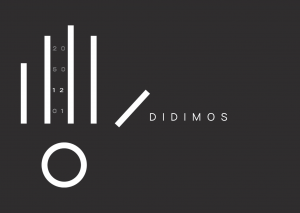
Unser Newsletter bespricht mindestens einmal im Monat kurz die neuesten Ergebnisse unserer futurologischen Ausgrabungen (und dient generell als Hinweis auf neue „Future Drops“). Zuweilen gibt es auch Hinweise auf Aufführungen oder andere relevante Dinge.
Und keine Angst; wir spammen niemanden zu.
DATENSCHUTZERKLÄRUNG
Didimos nimmt den Schutz Ihrer personenbezogenen Daten sehr ernst und hält sich strikt an die geltenden datenschutzrechtlichen Bestimmungen.
1. DATENSCHUTZ AUF EINEN BLICK
ALLGEMEINE HINWEISE
Die folgenden Hinweise geben einen einfachen Überblick darüber, was mit Ihren personenbezogenen Daten passiert, wenn Sie diese Website besuchen. Personenbezogene Daten sind alle Daten, mit denen Sie persönlich identifiziert werden können. Ausführliche Informationen zum Thema Datenschutz entnehmen Sie unserer unter diesem Text aufgeführten Datenschutzerklärung.
DATENERFASSUNG AUF DIESER WEBSITE
WER IST VERANTWORTLICH FÜR DIE DATENERFASSUNG AUF DIESER WEBSITE?
Die Datenverarbeitung auf dieser Website erfolgt durch den Websitebetreiber. Dessen Kontaktdaten können Sie dem Abschnitt „Hinweis zur Verantwortlichen Stelle“ in dieser Datenschutzerklärung entnehmen.
WIE ERFASSEN WIR IHRE DATEN?
Ihre Daten werden zum einen dadurch erhoben, dass Sie uns diese mitteilen. Hierbei kann es sich z. B. um Daten handeln, die Sie in ein Kontaktformular eingeben.
Andere Daten werden automatisch oder nach Ihrer Einwilligung beim Besuch der Website durch unsere IT-Systeme erfasst. Das sind vor allem technische Daten (z. B. Internetbrowser, Betriebssystem oder Uhrzeit des Seitenaufrufs). Die Erfassung dieser Daten erfolgt automatisch, sobald Sie diese Website betreten.
WOFÜR NUTZEN WIR IHRE DATEN?
Ein Teil der Daten wird erhoben, um eine fehlerfreie Bereitstellung der Website zu gewährleisten. Andere Daten können zur Analyse Ihres Nutzerverhaltens verwendet werden.
WELCHE RECHTE HABEN SIE BEZÜGLICH IHRER DATEN?
Sie haben jederzeit das Recht, unentgeltlich Auskunft über Herkunft, Empfänger und Zweck Ihrer gespeicherten personenbezogenen Daten zu erhalten. Sie haben außerdem ein Recht, die Berichtigung oder Löschung dieser Daten zu verlangen. Wenn Sie eine Einwilligung zur Datenverarbeitung erteilt haben, können Sie diese Einwilligung jederzeit für die Zukunft widerrufen. Außerdem haben Sie das Recht, unter bestimmten Umständen die Einschränkung der Verarbeitung Ihrer personenbezogenen Daten zu verlangen. Des Weiteren steht Ihnen ein Beschwerderecht bei der zuständigen Aufsichtsbehörde zu.
Hierzu sowie zu weiteren Fragen zum Thema Datenschutz können Sie sich jederzeit an uns wenden.
ANALYSE-TOOLS UND TOOLS VON DRITTANBIETERN
Beim Besuch dieser Website kann Ihr Surf-Verhalten statistisch ausgewertet werden. Das geschieht vor allem mit sogenannten Analyseprogrammen.
Detaillierte Informationen zu diesen Analyseprogrammen finden Sie in der folgenden Datenschutzerklärung.
2. HOSTING UND CONTENT DELIVERY NETWORKS (CDN)
EXTERNES HOSTING
Diese Website wird bei einem externen Dienstleister gehostet (Hoster). Die personenbezogenen Daten, die auf dieser Website erfasst werden, werden auf den Servern des Hosters gespeichert. Hierbei kann es sich v. a. um IP-Adressen, Kontaktanfragen, Meta- und Kommunikationsdaten, Vertragsdaten, Kontaktdaten, Namen, Websitezugriffe und sonstige Daten, die über eine Website generiert werden, handeln.
Der Einsatz des Hosters erfolgt zum Zwecke der Vertragserfüllung gegenüber unseren potenziellen und bestehenden Kunden (Art. 6 Abs. 1 lit. b DSGVO) und im Interesse einer sicheren, schnellen und effizienten Bereitstellung unseres Online-Angebots durch einen professionellen Anbieter (Art. 6 Abs. 1 lit. f DSGVO).
Unser Hoster wird Ihre Daten nur insoweit verarbeiten, wie dies zur Erfüllung seiner Leistungspflichten erforderlich ist und unsere Weisungen in Bezug auf diese Daten befolgen.
Wir setzen folgenden Hoster ein:
1&1 IONOS SE
Elgendorfer Straße 57
56410 Montabaur
Hauptsitz Montabaur, Amtsgericht Montabaur, HRB 24498
Vorstand: Hüseyin Dogan, Dr. Martin Endreß, Claudia Frese, Hans-Henning Kettler, Arthur Mai, Matthias Steinberg, Achim Weiss
3. ALLGEMEINE HINWEISE UND PFLICHTINFORMATIONEN
DATENSCHUTZ
Die Betreiber dieser Seiten nehmen den Schutz Ihrer persönlichen Daten sehr ernst. Wir behandeln Ihre personenbezogenen Daten vertraulich und entsprechend der gesetzlichen Datenschutzvorschriften sowie dieser Datenschutzerklärung.
Wenn Sie diese Website benutzen, werden verschiedene personenbezogene Daten erhoben. Personenbezogene Daten sind Daten, mit denen Sie persönlich identifiziert werden können. Die vorliegende Datenschutzerklärung erläutert, welche Daten wir erheben und wofür wir sie nutzen. Sie erläutert auch, wie und zu welchem Zweck das geschieht.
Wir weisen darauf hin, dass die Datenübertragung im Internet (z. B. bei der Kommunikation per E-Mail) Sicherheitslücken aufweisen kann. Ein lückenloser Schutz der Daten vor dem Zugriff durch Dritte ist nicht möglich.
HINWEIS ZUR VERANTWORTLICHEN STELLE
Die verantwortliche Stelle für die Datenverarbeitung auf dieser Website ist:
DIDIMOS Künstlerkollektiv
Martinsfeld 23, 50676 Köln
Verantwortliche Stelle ist die natürliche oder juristische Person, die allein oder gemeinsam mit anderen über die Zwecke und Mittel der Verarbeitung von personenbezogenen Daten (z. B. Namen, E-Mail-Adressen o. Ä.) entscheidet.
SPEICHERDAUER
Soweit innerhalb dieser Datenschutzerklärung keine speziellere Speicherdauer genannt wurde, verbleiben Ihre personenbezogenen Daten bei uns, bis der Zweck für die Datenverarbeitung entfällt. Wenn Sie ein berechtigtes Löschersuchen geltend machen oder eine Einwilligung zur Datenverarbeitung widerrufen, werden Ihre Daten gelöscht, sofern wir keine anderen rechtlich zulässigen Gründe für die Speicherung Ihrer personenbezogenen Daten haben (z.B. steuer- oder handelsrechtliche Aufbewahrungsfristen); im letztgenannten Fall erfolgt die Löschung nach Fortfall dieser Gründe.
HINWEIS ZUR DATENWEITERGABE IN DIE USA UND SONSTIGE DRITTSTAATEN
Auf unserer Website sind unter anderem Tools von Unternehmen mit Sitz in den USA oder sonstigen datenschutzrechtlich nicht sicheren Drittstaaten eingebunden. Wenn diese Tools aktiv sind, können Ihre personenbezogenen Daten in diese Drittstaaten übertragen und dort verarbeitet werden. Wir weisen darauf hin, dass in diesen Ländern kein mit der EU vergleichbares Datenschutzniveau garantiert werden kann. Beispielsweise sind US-Unternehmen dazu verpflichtet, personenbezogene Daten an Sicherheitsbehörden herauszugeben, ohne dass Sie als Betroffener hiergegen gerichtlich vorgehen könnten. Es kann daher nicht ausgeschlossen werden, dass US-Behörden (z.B. Geheimdienste) Ihre auf US-Servern befindlichen Daten zu Überwachungszwecken verarbeiten, auswerten und dauerhaft speichern. Wir haben auf diese Verarbeitungstätigkeiten keinen Einfluss.
WIDERRUF IHRER EINWILLIGUNG ZUR DATENVERARBEITUNG
Viele Datenverarbeitungsvorgänge sind nur mit Ihrer ausdrücklichen Einwilligung möglich. Sie können eine bereits erteilte Einwilligung jederzeit widerrufen. Die Rechtmäßigkeit der bis zum Widerruf erfolgten Datenverarbeitung bleibt vom Widerruf unberührt.
Widerspruchsrecht gegen die datenerhebung in besonderen fällen sowie gegen direktwerbung (art. 21 dsgvo)
Wenn die Datenverarbeitung auf Grundlage von Art. 6 abs. 1 lit. E oder f DSGVO erfolgt, haben sie jederzeit das Recht, aus Gründen, die sich aus ihrer besonderen Situation ergeben, gegen die Verarbeitung ihrer personenbezogenen Daten Widerspruch einzulegen; dies gilt auch für ein auf diese Bestimmungen gestütztes Profiling. Die jeweilige Rechtsgrundlage, auf denen eine Verarbeitung beruht, entnehmen sie dieser Datenschutzerklärung. Wenn sie Widerspruch einlegen, werden wir ihre betroffenen personenbezogenen Daten nicht mehr verarbeiten, es sei denn, wir können zwingende schutzwürdige Gründe für die Verarbeitung nachweisen, die ihre Interessen, Rechte und Freiheiten überwiegen oder die Verarbeitung dient der Geltendmachung, Ausübung oder Verteidigung von Rechtsansprüchen (Widerspruch nach art. 21 abs. 1 dsgvo).
Werden ihre personenbezogenen Daten verarbeitet, um Direktwerbung zu betreiben, so haben sie das recht, jederzeit Widerspruch gegen die Verarbeitung sie betreffender personenbezogener Daten zum Zwecke derartiger Werbung einzulegen; dies gilt auch für das Profiling, soweit es mit solcher Direktwerbung in Verbindung steht. Wenn sie widersprechen, werden ihre personenbezogenen Daten anschliessend nicht mehr zum Zwecke der Direktwerbung verwendet (Widerspruch nach art. 21 abs. 2 DSGVO).
Beschwerderecht bei der zuständigen aufsichtsbehörde
Im Falle von Verstößen gegen die DSGVO steht den Betroffenen ein Beschwerderecht bei einer Aufsichtsbehörde, insbesondere in dem Mitgliedstaat ihres gewöhnlichen Aufenthalts, ihres Arbeitsplatzes oder des Orts des mutmaßlichen Verstoßes zu. Das Beschwerderecht besteht unbeschadet anderweitiger verwaltungsrechtlicher oder gerichtlicher Rechtsbehelfe.
RECHT AUF DATENÜBERTRAGBARKEIT
Sie haben das Recht, Daten, die wir auf Grundlage Ihrer Einwilligung oder in Erfüllung eines Vertrags automatisiert verarbeiten, an sich oder an einen Dritten in einem gängigen, maschinenlesbaren Format aushändigen zu lassen. Sofern Sie die direkte Übertragung der Daten an einen anderen Verantwortlichen verlangen, erfolgt dies nur, soweit es technisch machbar ist.
AUSKUNFT, LÖSCHUNG UND BERICHTIGUNG
Sie haben im Rahmen der geltenden gesetzlichen Bestimmungen jederzeit das Recht auf unentgeltliche Auskunft über Ihre gespeicherten personenbezogenen Daten, deren Herkunft und Empfänger und den Zweck der Datenverarbeitung und ggf. ein Recht auf Berichtigung oder Löschung dieser Daten. Hierzu sowie zu weiteren Fragen zum Thema personenbezogene Daten können Sie sich jederzeit an uns wenden.
RECHT AUF EINSCHRÄNKUNG DER VERARBEITUNG
Sie haben das Recht, die Einschränkung der Verarbeitung Ihrer personenbezogenen Daten zu verlangen. Hierzu können Sie sich jederzeit an uns wenden. Das Recht auf Einschränkung der Verarbeitung besteht in folgenden Fällen:
- Wenn Sie die Richtigkeit Ihrer bei uns gespeicherten personenbezogenen Daten bestreiten, benötigen wir in der Regel Zeit, um dies zu überprüfen. Für die Dauer der Prüfung haben Sie das Recht, die Einschränkung der Verarbeitung Ihrer personenbezogenen Daten zu verlangen.
- Wenn die Verarbeitung Ihrer personenbezogenen Daten unrechtmäßig geschah/geschieht, können Sie statt der Löschung die Einschränkung der Datenverarbeitung verlangen.
- Wenn wir Ihre personenbezogenen Daten nicht mehr benötigen, Sie sie jedoch zur Ausübung, Verteidigung oder Geltendmachung von Rechtsansprüchen benötigen, haben Sie das Recht, statt der Löschung die Einschränkung der Verarbeitung Ihrer personenbezogenen Daten zu verlangen.
- Wenn Sie einen Widerspruch nach Art. 21 Abs. 1 DSGVO eingelegt haben, muss eine Abwägung zwischen Ihren und unseren Interessen vorgenommen werden. Solange noch nicht feststeht, wessen Interessen überwiegen, haben Sie das Recht, die Einschränkung der Verarbeitung Ihrer personenbezogenen Daten zu verlangen.
Wenn Sie die Verarbeitung Ihrer personenbezogenen Daten eingeschränkt haben, dürfen diese Daten – von ihrer Speicherung abgesehen – nur mit Ihrer Einwilligung oder zur Geltendmachung, Ausübung oder Verteidigung von Rechtsansprüchen oder zum Schutz der Rechte einer anderen natürlichen oder juristischen Person oder aus Gründen eines wichtigen öffentlichen Interesses der Europäischen Union oder eines Mitgliedstaats verarbeitet werden.
WIDERSPRUCH GEGEN WERBE-E-MAILS
Der Nutzung von im Rahmen der Impressumspflicht veröffentlichten Kontaktdaten zur Übersendung von nicht ausdrücklich angeforderter Werbung und Informationsmaterialien wird hiermit widersprochen. Die Betreiber der Seiten behalten sich ausdrücklich rechtliche Schritte im Falle der unverlangten Zusendung von Werbeinformationen, etwa durch Spam-E-Mails, vor.
4. DATENERFASSUNG AUF DIESER WEBSITE
COOKIES
Unsere Internetseiten verwenden so genannte „Cookies“. Cookies sind kleine Textdateien und richten auf Ihrem Endgerät keinen Schaden an. Sie werden entweder vorübergehend für die Dauer einer Sitzung (Session-Cookies) oder dauerhaft (permanente Cookies) auf Ihrem Endgerät gespeichert. Session-Cookies werden nach Ende Ihres Besuchs automatisch gelöscht. Permanente Cookies bleiben auf Ihrem Endgerät gespeichert, bis Sie diese selbst löschen oder eine automatische Löschung durch Ihren Webbrowser erfolgt.
Teilweise können auch Cookies von Drittunternehmen auf Ihrem Endgerät gespeichert werden, wenn Sie unsere Seite betreten (Third-Party-Cookies). Diese ermöglichen uns oder Ihnen die Nutzung bestimmter Dienstleistungen des Drittunternehmens (z.B. Cookies zur Abwicklung von Zahlungsdienstleistungen).
Cookies haben verschiedene Funktionen. Zahlreiche Cookies sind technisch notwendig, da bestimmte Websitefunktionen ohne diese nicht funktionieren würden (z.B. die Warenkorbfunktion oder die Anzeige von Videos). Andere Cookies dienen dazu, das Nutzerverhalten auszuwerten oder Werbung anzuzeigen.
Cookies, die zur Durchführung des elektronischen Kommunikationsvorgangs (notwendige Cookies) oder zur Bereitstellung bestimmter, von Ihnen erwünschter Funktionen (funktionale Cookies, z. B. für die Warenkorbfunktion) oder zur Optimierung der Website (z.B. Cookies zur Messung des Webpublikums) erforderlich sind, werden auf Grundlage von Art. 6 Abs. 1 lit. f DSGVO gespeichert, sofern keine andere Rechtsgrundlage angegeben wird. Der Websitebetreiber hat ein berechtigtes Interesse an der Speicherung von Cookies zur technisch fehlerfreien und optimierten Bereitstellung seiner Dienste. Sofern eine Einwilligung zur Speicherung von Cookies abgefragt wurde, erfolgt die Speicherung der betreffenden Cookies ausschließlich auf Grundlage dieser Einwilligung (Art. 6 Abs. 1 lit. a DSGVO); die Einwilligung ist jederzeit widerrufbar.
Sie können Ihren Browser so einstellen, dass Sie über das Setzen von Cookies informiert werden und Cookies nur im Einzelfall erlauben, die Annahme von Cookies für bestimmte Fälle oder generell ausschließen sowie das automatische Löschen der Cookies beim Schließen des Browsers aktivieren. Bei der Deaktivierung von Cookies kann die Funktionalität dieser Website eingeschränkt sein.
Soweit Cookies von Drittunternehmen oder zu Analysezwecken eingesetzt werden, werden wir Sie hierüber im Rahmen dieser Datenschutzerklärung gesondert informieren und ggf. eine Einwilligung abfragen.
SERVER-LOG-DATEIEN
Der Provider der Seiten erhebt und speichert automatisch Informationen in so genannten Server-Log-Dateien, die Ihr Browser automatisch an uns übermittelt. Dies sind:
- Browsertyp und Browserversion
- verwendetes Betriebssystem
- Referrer URL
- Hostname des zugreifenden Rechners
- Uhrzeit der Serveranfrage
- IP-Adresse
Eine Zusammenführung dieser Daten mit anderen Datenquellen wird nicht vorgenommen.
Die Erfassung dieser Daten erfolgt auf Grundlage von Art. 6 Abs. 1 lit. f DSGVO. Der Websitebetreiber hat ein berechtigtes Interesse an der technisch fehlerfreien Darstellung und der Optimierung seiner Website – hierzu müssen die Server-Log-Files erfasst werden.
KONTAKTFORMULAR
Wenn Sie uns per Kontaktformular Anfragen zukommen lassen, werden Ihre Angaben aus dem Anfrageformular inklusive der von Ihnen dort angegebenen Kontaktdaten zwecks Bearbeitung der Anfrage und für den Fall von Anschlussfragen bei uns gespeichert. Diese Daten geben wir nicht ohne Ihre Einwilligung weiter.
Die Verarbeitung dieser Daten erfolgt auf Grundlage von Art. 6 Abs. 1 lit. b DSGVO, sofern Ihre Anfrage mit der Erfüllung eines Vertrags zusammenhängt oder zur Durchführung vorvertraglicher Maßnahmen erforderlich ist. In allen übrigen Fällen beruht die Verarbeitung auf unserem berechtigten Interesse an der effektiven Bearbeitung der an uns gerichteten Anfragen (Art. 6 Abs. 1 lit. f DSGVO) oder auf Ihrer Einwilligung (Art. 6 Abs. 1 lit. a DSGVO) sofern diese abgefragt wurde.
Die von Ihnen im Kontaktformular eingegebenen Daten verbleiben bei uns, bis Sie uns zur Löschung auffordern, Ihre Einwilligung zur Speicherung widerrufen oder der Zweck für die Datenspeicherung entfällt (z. B. nach abgeschlossener Bearbeitung Ihrer Anfrage). Zwingende gesetzliche Bestimmungen – insbesondere Aufbewahrungsfristen – bleiben unberührt.
ANFRAGE PER E-MAIL, TELEFON ODER TELEFAX
Wenn Sie uns per E-Mail, Telefon oder Telefax kontaktieren, wird Ihre Anfrage inklusive aller daraus hervorgehenden personenbezogenen Daten (Name, Anfrage) zum Zwecke der Bearbeitung Ihres Anliegens bei uns gespeichert und verarbeitet. Diese Daten geben wir nicht ohne Ihre Einwilligung weiter.
Die Verarbeitung dieser Daten erfolgt auf Grundlage von Art. 6 Abs. 1 lit. b DSGVO, sofern Ihre Anfrage mit der Erfüllung eines Vertrags zusammenhängt oder zur Durchführung vorvertraglicher Maßnahmen erforderlich ist. In allen übrigen Fällen beruht die Verarbeitung auf unserem berechtigten Interesse an der effektiven Bearbeitung der an uns gerichteten Anfragen (Art. 6 Abs. 1 lit. f DSGVO) oder auf Ihrer Einwilligung (Art. 6 Abs. 1 lit. a DSGVO) sofern diese abgefragt wurde.
Die von Ihnen an uns per Kontaktanfragen übersandten Daten verbleiben bei uns, bis Sie uns zur Löschung auffordern, Ihre Einwilligung zur Speicherung widerrufen oder der Zweck für die Datenspeicherung entfällt (z. B. nach abgeschlossener Bearbeitung Ihres Anliegens). Zwingende gesetzliche Bestimmungen – insbesondere gesetzliche Aufbewahrungsfristen – bleiben unberührt.
5. NEWSLETTER
NEWSLETTERDATEN
Wenn Sie den auf der Website angebotenen Newsletter beziehen möchten, benötigen wir von Ihnen eine E-Mail-Adresse sowie Informationen, welche uns die Überprüfung gestatten, dass Sie der Inhaber der angegebenen E-Mail-Adresse sind und mit dem Empfang des Newsletters einverstanden sind. Weitere Daten werden nicht bzw. nur auf freiwilliger Basis erhoben. Diese Daten verwenden wir ausschließlich für den Versand der angeforderten Informationen und geben diese nicht an Dritte weiter.
Die Verarbeitung der in das Newsletteranmeldeformular eingegebenen Daten erfolgt ausschließlich auf Grundlage Ihrer Einwilligung (Art. 6 Abs. 1 lit. a DSGVO). Die erteilte Einwilligung zur Speicherung der Daten, der E-Mail-Adresse sowie deren Nutzung zum Versand des Newsletters können Sie jederzeit widerrufen, etwa über den „Austragen“-Link im Newsletter. Die Rechtmäßigkeit der bereits erfolgten Datenverarbeitungsvorgänge bleibt vom Widerruf unberührt.
Die von Ihnen zum Zwecke des Newsletter-Bezugs bei uns hinterlegten Daten werden von uns bis zu Ihrer Austragung aus dem Newsletter bei uns bzw. dem Newsletterdiensteanbieter gespeichert und nach der Abbestellung des Newsletters oder nach Zweckfortfall aus der Newsletterverteilerliste gelöscht. Wir behalten uns vor, E-Mail-Adressen aus unserem Newsletterverteiler nach eigenem Ermessen im Rahmen unseres berechtigten Interesses nach Art. 6 Abs. 1 lit. f DSGVO zu löschen oder zu sperren.
Nach Ihrer Austragung aus der Newsletterverteilerliste wird Ihre E-Mail-Adresse bei uns bzw. dem Newsletterdiensteanbieter ggf. in einer Blacklist gespeichert, um künftige Mailings zu verhindern. Die Daten aus der Blacklist werden nur für diesen Zweck verwendet und nicht mit anderen Daten zusammengeführt. Dies dient sowohl Ihrem Interesse als auch unserem Interesse an der Einhaltung der gesetzlichen Vorgaben beim Versand von Newslettern (berechtigtes Interesse im Sinne des Art. 6 Abs. 1 lit. f DSGVO). Die Speicherung in der Blacklist ist zeitlich nicht befristet. Sie können der Speicherung widersprechen, sofern Ihre Interessen unser berechtigtes Interesse überwiegen.
6. PLUGINS UND TOOLS
VIMEO
Diese Website bindet Videos der Website Vimeo ein.
Wenn Sie eine unserer Webseiten besuchen, auf denen Vimeo eingebunden ist, wird eine Verbindung zu den Servern von Vimeo hergestellt. Dabei wird dem Vimeo-Server mitgeteilt, welche unserer Seiten Sie besucht haben.
Des Weiteren kann Vimeo verschiedene Cookies auf Ihrem Endgerät speichern oder vergleichbare Technologien zur Wiedererkennung verwenden (z.B. Device-Fingerprinting). Auf diese Weise kann Vimeo Informationen über Besucher dieser Website erhalten. Diese Informationen werden u. a. verwendet, um Videostatistiken zu erfassen, die Anwenderfreundlichkeit zu verbessern und Betrugsversuchen vorzubeugen.
Wenn Sie in Ihrem Vimeo-Account eingeloggt sind, ermöglichen Sie Vimeo, Ihr Surfverhalten direkt Ihrem persönlichen Profil zuzuordnen. Dies können Sie verhindern, indem Sie sich aus Ihrem Vimeo-Account ausloggen.
Die Nutzung von Vimeo erfolgt im Interesse einer ansprechenden Darstellung unserer Online-Angebote. Dies stellt ein berechtigtes Interesse im Sinne von Art. 6 Abs. 1 lit. f DSGVO dar. Sofern eine entsprechende Einwilligung abgefragt wurde, erfolgt die Verarbeitung ausschließlich auf Grundlage von Art. 6 Abs. 1 lit. a DSGVO; die Einwilligung ist jederzeit widerrufbar.
Weitere Informationen zum Umgang mit Nutzerdaten finden Sie in der Datenschutzerklärung von Vimeo
VIMEO
Diese Website nutzt Plugins des Videoportals Vimeo. Anbieter ist die Vimeo Inc., 555 West 18th Street, New York, New York 10011, USA.
Wenn Sie eine unserer mit einem Vimeo-Video ausgestatteten Seiten besuchen, wird eine Verbindung zu den Servern von Vimeo hergestellt. Dabei wird dem Vimeo-Server mitgeteilt, welche unserer Seiten Sie besucht haben. Zudem erlangt Vimeo Ihre IP-Adresse. Dies gilt auch dann, wenn Sie nicht bei Vimeo eingeloggt sind oder keinen Account bei Vimeo besitzen. Die von Vimeo erfassten Informationen werden an den Vimeo-Server in den USA übermittelt.
Wenn Sie in Ihrem Vimeo-Account eingeloggt sind, ermöglichen Sie Vimeo, Ihr Surfverhalten direkt Ihrem persönlichen Profil zuzuordnen. Dies können Sie verhindern, indem Sie sich aus Ihrem Vimeo-Account ausloggen.
Zur Wiedererkennung der Websitebesucher verwendet Vimeo Cookies bzw. vergleichbare Wiedererkennungstechnologien (z.B. Device-Fingerprinting).
Die Nutzung von Vimeo erfolgt im Interesse einer ansprechenden Darstellung unserer Online-Angebote. Dies stellt ein berechtigtes Interesse im Sinne des Art. 6 Abs. 1 lit. f DSGVO dar. Sofern eine entsprechende Einwilligung abgefragt wurde, erfolgt die Verarbeitung ausschließlich auf Grundlage von Art. 6 Abs. 1 lit. a DSGVO; die Einwilligung ist jederzeit widerrufbar.
Die Datenübertragung in die USA wird auf die Standardvertragsklauseln der EU-Kommission sowie nach Aussage von Vimeo auf „berechtigte Geschäftsinteressen“ gestützt. Details finden Sie hier: https://vimeo.com/privacy .
Weitere Informationen zum Umgang mit Nutzerdaten finden Sie in der Datenschutzerklärung von Vimeo unter: https://vimeo.com/privacy .
GOOGLE RECAPTCHA
Wir nutzen „Google reCAPTCHA“ (im Folgenden „reCAPTCHA“) auf dieser Website. Anbieter ist die Google Ireland Limited („Google“), Gordon House, Barrow Street, Dublin 4, Irland.
Mit reCAPTCHA soll überprüft werden, ob die Dateneingabe auf dieser Website (z. B. in einem Kontaktformular) durch einen Menschen oder durch ein automatisiertes Programm erfolgt. Hierzu analysiert reCAPTCHA das Verhalten des Websitebesuchers anhand verschiedener Merkmale. Diese Analyse beginnt automatisch, sobald der Websitebesucher die Website betritt. Zur Analyse wertet reCAPTCHA verschiedene Informationen aus (z. B. IP-Adresse, Verweildauer des Websitebesuchers auf der Website oder vom Nutzer getätigte Mausbewegungen). Die bei der Analyse erfassten Daten werden an Google weitergeleitet.
Die reCAPTCHA-Analysen laufen vollständig im Hintergrund. Websitebesucher werden nicht darauf hingewiesen, dass eine Analyse stattfindet.
Die Speicherung und Analyse der Daten erfolgt auf Grundlage von Art. 6 Abs. 1 lit. f DSGVO. Der Websitebetreiber hat ein berechtigtes Interesse daran, seine Webangebote vor missbräuchlicher automatisierter Ausspähung und vor SPAM zu schützen. Sofern eine entsprechende Einwilligung abgefragt wurde, erfolgt die Verarbeitung ausschließlich auf Grundlage von Art. 6 Abs. 1 lit. a DSGVO; die Einwilligung ist jederzeit widerrufbar.
Weitere Informationen zu Google reCAPTCHA entnehmen Sie den Google-Datenschutzbestimmungen und den Google Nutzungsbedingungen unter folgenden Links: https://policies.google.com/privacy?hl=de und https://policies.google.com/terms?hl=de
IMPRESSUM
Angaben gemäß § 5 Abs. 1 Telemediengesetz
DIDIMOS Künstlerkollektiv c/o Erica von Moeller
Martinsfeld 23, 50676 Köln
Mail: info@didimos.org
Vertreten durch:
Erica von Moeller, Sönke Lars Neuwöhner, Sven Holly Nullmeyer
Inhaltlich Verantwortliche gemäß § 18 Abs. 2 MStV /
Persons responsible concerning the contents according to § 18 Abs. 2 MStV:
Erica von Moeller, Sönke Lars Neuwöhner, Sven Holly Nullmeyer
Martinsfeld 23, 50676 Köln
Konzept, Gestaltung und Realisierung der Website stammt von
Kristian Wolf
chewing the sun GmbH
Friedrich-Ebert-Strasse 134
42117 Wuppertal, Germany
Phone 0202 946734-0
Fax 0202 946734-20
hello@chewingthesun.com
Fotos
Erica von Moeller, Sönke Lars Neuwöhner, Sven Holly Nullmeyer, Silas Wolf
Videos
Erica von Moeller,
Studiengang Design audiovisueller Medien der Bergischen Universität Wuppertal
Förderer
DIDIMOS wird gefördert durch:
Die Gestaltung und Umsetzung der Homepage hat die European Climate Foundation ermöglicht . Die Inhalte in Form von wissenschaftlicher Recherche wurden von der Mercator Stiftung Essen gefördert. Die Interviews mit den Wissenschaftler*innen sind mit Unterstützung der Film- und Medienstiftung NRW GmbH entstanden.
Der Studiengang Design audiovisueller Medien der Bergischen Universität Wuppertal hat mit vielen Studierenden Videos produziert.
Das Wuppertal Institut mit ua. Prof. Dr. Philipp Schepelmann und die Bergische Universität Wuppertal haben wissenschaftlich das Projekt begleitet.
Haftung für Inhalte
Didimos ist um Richtigkeit und Aktualität der auf dieser Internetpräsenz bereitgestellten Informationen bemüht. Trotzdem können Fehler und Unklarheiten nicht vollständig ausgeschlossen werden. Didimos übernimmt deshalb keine Gewähr für die Aktualität, Richtigkeit, Vollständigkeit oder Qualität der bereitgestellten Informationen. Für Schäden materieller oder immaterieller Art, die durch die Nutzung oder Nichtnutzung der dargebotenen Informationen bzw. durch die Nutzung fehlerhafter und unvollständiger Informationen unmittelbar oder mittelbar verursacht werden, haftet Didimos nicht, sofern ihm nicht nachweislich vorsätzliches oder grob fahrlässiges Verschulden zur Last fällt. Didimos behält es sich vor, Teile des Internetangebots oder das gesamte Angebot ohne gesonderte Ankündigung zu verändern, zu ergänzen, zu löschen oder die Veröffentlichung zeitweise oder endgültig einzustellen.
Hinweise auf „fremde Inhalte“, die durch direkte oder indirekte Verknüpfungen (z. B. sogenannte „Links“) zu anderen Anbietern bereitgehalten werden, sind in geeigneter Weise gekennzeichnet. Didimos hat auf „fremde Inhalte“ keinerlei Einfluss und macht sich diese Inhalte auch nicht zu Eigen. Didimos hat keine positive Kenntnis über rechtswidrige oder anstößige Inhalte auf verknüpften Seiten fremder Anbieter. Sollten auf den verknüpften Seiten fremder Anbieter dennoch rechtswidrige oder anstößige Inhalte enthalten sein, so distanziert sich Didimos von diesen Inhalten ausdrücklich.
Haftung für Links
Unser Angebot enthält Links zu externen Websites Dritter, auf deren Inhalte wir keinen Einfluss haben. Deshalb können wir für diese fremden Inhalte auch keine Gewähr übernehmen. Für die Inhalte der verlinkten Seiten ist stets der jeweilige Anbieter oder Betreiber der Seiten verantwortlich. Die verlinkten Seiten wurden zum Zeitpunkt der Verlinkung auf mögliche Rechtsverstöße überprüft. Rechtswidrige Inhalte waren zum Zeitpunkt der Verlinkung nicht erkennbar. Eine permanente inhaltliche Kontrolle der verlinkten Seiten ist jedoch ohne konkrete Anhaltspunkte einer Rechtsverletzung nicht zumutbar. Bei Bekanntwerden von Rechtsverletzungen werden wir derartige Links umgehend entfernen.
Urheberrecht
Die durch die Seitenbetreiber erstellten Inhalte und Werke auf diesen Seiten unterliegen dem deutschen Urheberrecht. Die Vervielfältigung, Bearbeitung, Verbreitung und jede Art der Verwertung außerhalb der Grenzen des Urheberrechtes bedürfen der schriftlichen Zustimmung des jeweiligen Autors bzw. Erstellers. Downloads und Kopien dieser Seite sind nur für den privaten, nicht kommerziellen Gebrauch gestattet. Soweit die Inhalte auf dieser Seite nicht vom Betreiber erstellt wurden, werden die Urheberrechte Dritter beachtet. Insbesondere werden Inhalte Dritter als solche gekennzeichnet. Sollten Sie trotzdem auf eine Urheberrechtsverletzung aufmerksam werden, bitten wir um einen entsprechenden Hinweis. Bei Bekanntwerden von Rechtsverletzungen werden wir derartige Inhalte umgehend entfernen.


